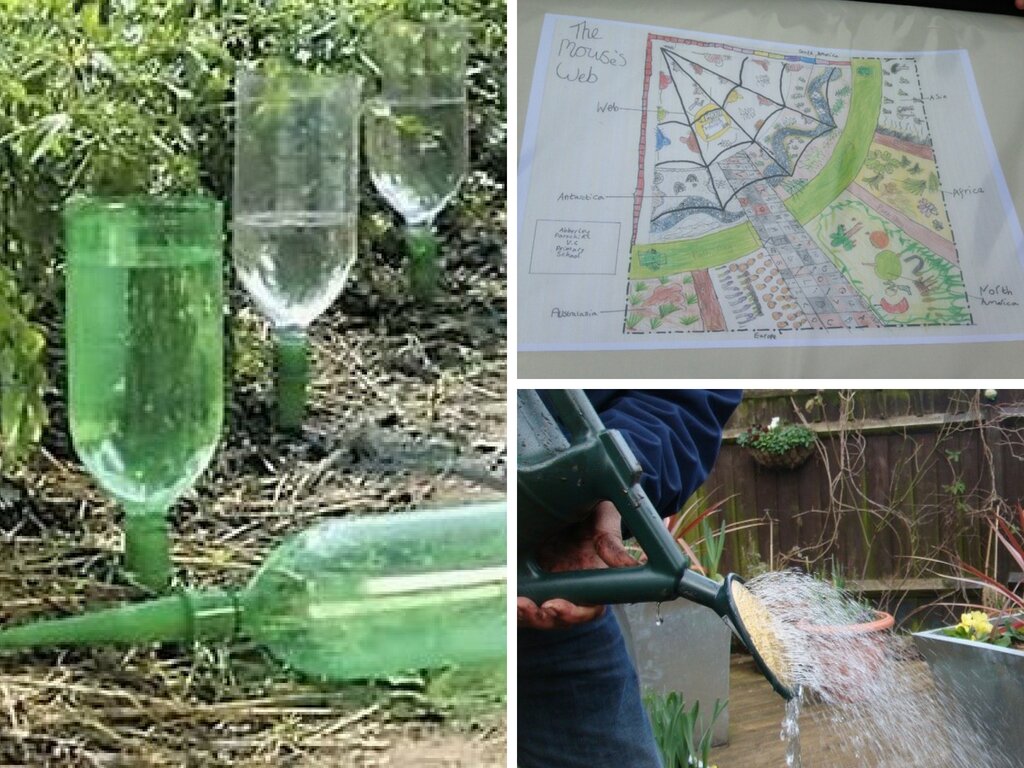
The countdown to the summer holidays is nearly over!
Follow these five simple steps before you head off for the break and you’ll have a healthy garden waiting for you when you return in September.
- Take stock of where you’re at
Have a quick look at your growing areas to see:
- What plants need looking after over the summer?
- Which ones can be cropped?
- Have you got time to squeeze in any last seed-to-plate plants like rocket or salad leaves?
- What wildlife has been visiting your school over the spring and summer?

If you have a lot of runner beans and tomatoes that have grown to a good size, but are yet to produce any fruit, you’ll want to keep them going over the summer. If you’re lucky enough to have a gardener or site manager to keep an eye on things, then that’s great, but if not, it’s good to have a few tricks up your sleeve to help stop your plants drying out.
- Plan for water conservation
- Firstly apply a good, thick organic mulch to any plants that will continue to grow during the summer holidays. If you have some home-made compost that’s great, if not some fine bark or green waste compost from the garden centre would be a good investment. Spread it on the top of your soil at about 5cm depth. This will help keep the roots moist and reduce the need to water.

- Another good trick is to collect a few plastic water bottles, remove the lid and fill with water, then cover the lid area with about five or six layers of cling film and secure with an elastic band. Then take a pin and make some holes, gently through the cling film. Turn the bottle upside down and bury the neck in the veg bed. The water will seep out slowly, keeping the plants watered. This technique can last up to a week, reducing the need for someone to come and water the plants. There are also products available in the garden centre and online that do the same job; they are basically small adjustable taps that fit to the tops of recycled water bottles.

- A final tip on water conservation is to make sure your planting or raised beds are filled out with plants. A full planting area reduces the need for watering and will stop weeds growing too. Why not underplant with some herbs or even some ‘green manure’?
Green manure is made of live plants, sown as seed and are very good for improving soils. A good example is mustard seed or you could try an easy quick crop like radish. Sow these seeds thickly but leave a space around the base of your existing plants, try around 10cm.
- Feed your plants
Now is the time to give your plants a good feed. Watering with a liquid feed diluted into your watering can will give your plants a boost. Tomato feed is a cheap easy option, or the ultimate fertiliser is organic comfrey pellets. However a small investment in a Comfrey plant (One called Bocking 14 is recommended) planted and grown in the school grounds will provide a steady supply of nutrient-rich liquid feed.
Simply harvest its leaves from time to time, soak in a bucket of water, then three weeks or so later, drain off the liquid and use as a feed. It’s known as Comfrey tea and it should be pointed out, is rather smelly! No doubt this will cause great amusement among any young members of the gardening club.
- Support your plants
It’s also a good time to check if your plants are well supported, as plants like tomatoes become much heavier as they bear fruit. Use canes to support them, tie in any heavy stems using soft twine, tied in a figure of eight. This method prevents rubbing and damage to the soft stems of many crops.
- Do a bit of forward planning
Of course, as the summer holidays loom it’s also a great time to think about what you will do with the space after the summer. Autumn and winter planning will be on all gardeners’ minds, as we like to plan ahead.
What do you want to grow over the autumn and winter? Broad beans? Chard or even spring cabbage? Why not look at a few seed catalogues and make a little plan for your garden space. You could even mix in some curriculum by undertaking a small design.
On that theme and to protect your crops, why not have a competition to design a Scarecrow? Desiging and building one from recycled materials is a great way to finish off the summer term.

Happy gardening and I wish you a very happy summer holidays!
Christopher M Collins
Head of Horticulture, Garden Organic

